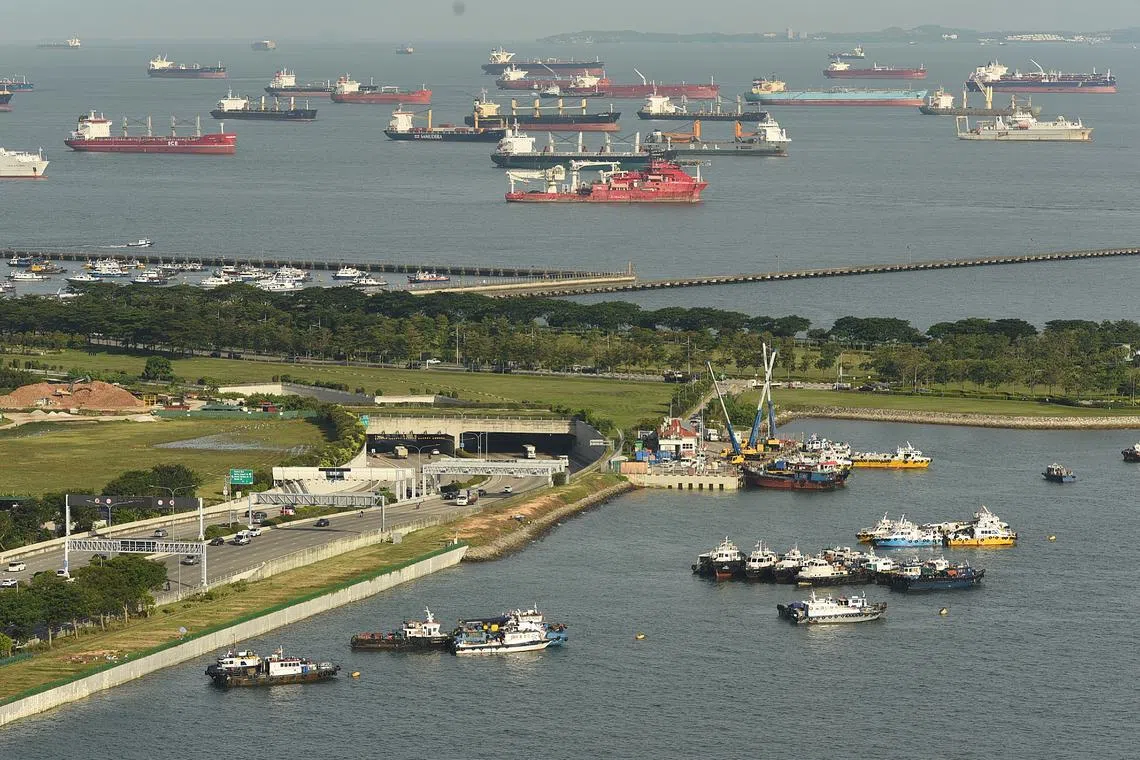S’pore maritime sector to focus on decarbonising, digitalising despite slower growth: Iswaran
Sign up now: Get ST's newsletters delivered to your inbox

A key enabler of Singapore’s decarbonisation and digitalisation ambitions and efforts is talent, said Transport Minister S. Iswaran.
ST PHOTO: DESMOND WEE
Follow topic:
SINGAPORE - The Republic’s maritime industry must remain focused on decarbonisation, digitalisation and nurturing talent to achieve these goals even as it handles immediate risks, said Transport Minister S. Iswaran on Monday.
These include prospects of a global economic slowdown and geopolitical strains, which will test the resilience and adaptability of the port, shipping and logistics sectors, the minister said at the opening ceremony of the Singapore Maritime Week 2023 (SMW).
“While we manage these proximate challenges, we must not lose sight of our longer-term imperatives – to build a safer, more efficient and sustainable maritime sector,” he said at the event held at the Ritz-Carlton in Singapore.
Organised by the Maritime and Port Authority of Singapore (MPA) and in its 27th edition this year, the SMW is expected to bring together about 20,000 participants to about 50 events throughout the week.
Mr Iswaran noted that the industry has gone through a turbulent period. Even as the world started to emerge from the Covid-19 pandemic, the conflict in Ukraine erupted, disrupting shipping and supply chains and affecting the lives of many seafarers, he said.
As a result, shipping freight rates soared
Since then, however, demand has eased and freight rates have fallen
Mr Iswaran said the cessation of the alliance may have far-reaching implications for the structure of the global shipping industry. “We in the maritime sector must grid ourselves for uncertainties in the near term.”
This comes as tighter monetary policies by central banks worldwide are dampening economic growth, with the International Monetary Fund projecting a fall in global growth
Meanwhile, geopolitical strains between the United States and China are also causing major shifts in trade and investment flows. This is raising the prospect of a potential breaking up of global supply chains, which will gravely test the maritime sector’s ability to adapt to a new operating environment.
However, the minister stressed: “As the most cost-efficient mode of transportation, shipping will continue to underpin, and grow with, global trade flows. We must leverage this to achieve our longer-term goals for the maritime industry.”
A key enabler of Singapore’s decarbonisation and digitalisation ambitions and efforts is talent, he said.
“Therefore, for the first time, a youth track has been introduced at SMW 2023 through the Maritime Manpower Forum’s panel dialogue, and the Youth@SMW platform for a focus-group discussion among youth on the future of maritime.”
The minister also announced the extension of a memorandum of understanding (MOU) between the MPA and the Shanghai Maritime University to deepen maritime talent and knowledge exchanges between Singapore and China.
This was done on the sidelines of the 4th Singapore-Shanghai Comprehensive Cooperation Council (SSCCC) meeting, which also took place on Monday.
The SSCCC was established in April 2019, to target six key areas of collaboration, namely, the Belt and Road Initiative, financial services cooperation, technology and innovation, ease of doing business, urban governance and people-to-people exchanges.
During his opening address at the SWM, International Maritime Organisation (IMO) secretary-general Kitack Lim noted that IMO member states are upgrading their strategy to reduce greenhouse gas emissions from international shipping by July 2023.
The IMO is a specialised agency of the United Nations which is responsible for measures to improve the safety and security of international shipping and to prevent pollution from ships.
Mr Lim added that collaboration, information-sharing, and capacity-building are key to ensuring no one is left behind in the push for decarbonisation.
Underscoring Singapore’s commitment to decarbonise and digitalise the maritime industry, MPA signed an MOU with the Port of Los Angeles and Port of Long Beach to establish a green and digital shipping corridor between Singapore and the San Pedro Bay port complex, where the two mega ports are based.
The corridor aims to enable ships plying the route between Singapore and the San Pedro Bay to achieve carbon-neutral emissions.
In addition to identifying and collaborating on pilot and demonstration projects, the MOU aims to identify and implement digital shipping solutions along the route and develop standards and best practices for greener ports and the bunkering of alternative marine fuels.


